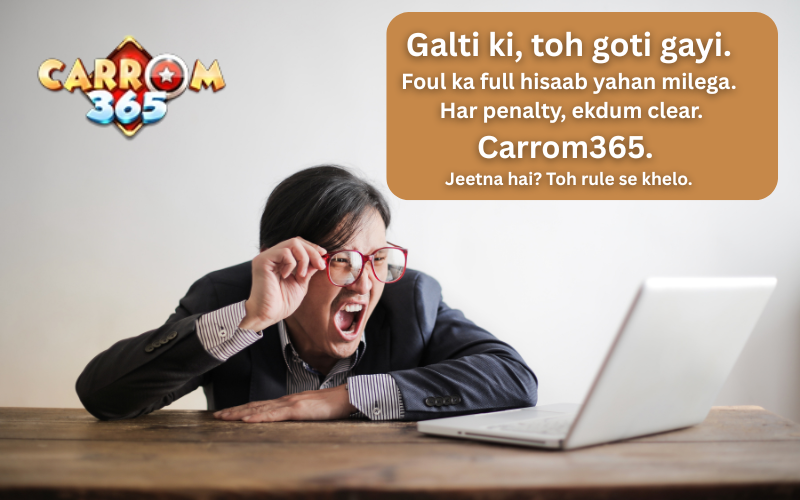It's one of the most sinking feelings in a game of carrom.
You line up a perfect shot. You flick the striker with confidence. You hear the satisfying thwack as your coin drops into the pocket... but then you hear a second, dreaded sound: the clatter of your striker falling into a pocket right behind it.

A single, accidental foul can cost you the entire game, turning a winning shot into a strategic gift for your opponent. This page is your definitive playbook on every foul rule to ensure you play a clean and powerful game. Once you've mastered how to avoid mistakes, our complete carrom guide will show you how to build a winning strategy from that solid foundation.
You've just committed a foul.
Understanding the carrom foul rules isn't just about playing clean. It's about protecting yourself from disaster. A single foul at the wrong moment doesn't just end your turn—it gifts your opponent a significant advantage.
This is your definitive guide to every foul in the game.
We will walk through each type of foul, explain the exact penalty, and give you the knowledge you need to play a flawless, strategic game.
The Core Concept: What is a Foul in Carrom?
A foul is any action taken during a player's turn that violates the official carrom rules.
Committing a foul has two immediate consequences:
- Your turn ends instantly.
- You must pay a penalty.
The Foul Penalty: A Painful Gift to Your Opponent
The standard penalty for almost every foul is that you must return one of your previously pocketed coins to the board.
Your opponent takes your coin and places this "penalty coin" anywhere they wish within the main center circle.
A clever opponent will use this opportunity to block your next shot, set up a combination play, or clutter the board against you. Avoiding fouls is a critical part of high-level strategy.
The Definitive List of Carrom Fouls
Let's break down every action that is considered a foul.
Category 1: Striker Fouls (The Most Common Mistakes)
These are the fouls that happen most often, especially with beginners.
1. Pocketing the Striker
If your striker falls into any pocket, your turn ends and you must pay the penalty.
2. The "Due": Pocketing the Striker AND Your Own Coin
You sink one of your coins but your striker follows it in.
- Penalty: The coin you pocketed is returned by your opponent, plus an additional penalty coin. Two of your coins go back on the board and your turn ends.
3. Sending the Striker Off the Board
If your striker flies completely off the playing surface, it's a foul. Your turn ends and you pay the penalty.
Category 2: Coin Fouls
These fouls relate to the carrom-men (the coins).
4. Sending a Coin Off the Board
If any coin leaves the board, it's a foul. Your turn ends and you pay the penalty. The coin is placed back in the center.
5. Pocketing the Queen Illegally
Pocketing the Queen before you've pocketed any of your own coins is a foul. The Queen returns to the center, you pay a penalty coin, and your turn ends.
6. Pocketing Your Opponent's Last Coin
If your opponent has only one coin left and you pocket it for them, you lose the board.
7. Pocketing Your Last Coin Before the Queen
Clearing your final coin while the Queen remains on the board means you lose the board. The Queen must be pocketed and covered before your last coin.
Category 3: Technical & Physical Fouls
These fouls relate to your physical actions and shooting technique.
8. Illegal Striking Technique
The striker must be flicked in a single, clean forward motion. Pushing, multiple touches, or "thumbing" techniques are fouls.
9. Crossing the Foul Line
Your elbow must not cross the imaginary diagonal foul lines of the board when shooting.
10. Moving Your Chair or the Board
You must remain seated. Standing up, lifting, or shifting your chair, or moving the board is a foul.
11. Touching Any Other Piece
The only piece you may touch is your striker. If you touch any other coin, it's a foul.
What Happens if I Don't Have Any Coins to Pay a Penalty?
If you have no coins in your pocket to return, you go into "debt." The next time you legally pocket a coin, it is immediately returned to the board as your penalty. You must pay this debt before you pocket any other coins.
Your Path to Flawless Play
You now have a comprehensive understanding of the carrom foul rules. You know what to avoid and the severe penalties involved.
This knowledge is crucial for defensive play. Next, see how all rules—from the break to the Queen—fit together on our main rules page:
The best way to internalize these rules is to see them in action. Notice potential fouls during your next match. By being mindful, you'll avoid mistakes and spot when opponents falter.
Welcome to a cleaner, more strategic, and confident way to play carrom.


